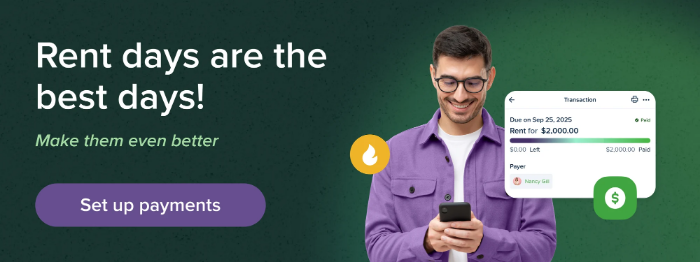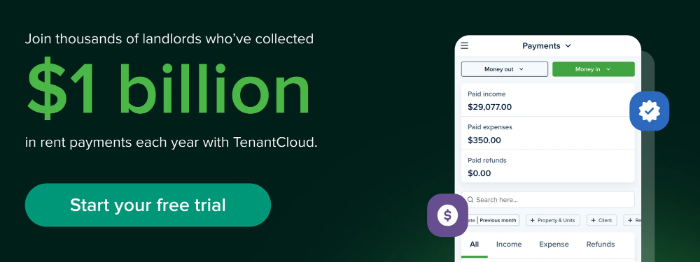TL;DR
- When paying rent in 2025, tenants have three primary options: ACH transfers, credit cards, and debit cards.
- ACH payments offer the lowest fees ($0-$3 flat) and strong security, but take 1-3 business days to process.
- Credit cards are the fastest and offer rewards, but cost 2.5-3.5% per transaction.
- Debit cards fall somewhere between both options, with $1-$4 flat fees.
- Most tenants prefer ACH for recurring payments to avoid late fees and minimize costs.
While other payment apps are available for transferring money between friends and family or completing e-commerce transactions for products or services, in the real estate world, three payment methods are most commonly accepted: debit, credit, and ACH.
These payment methods are integrated with various property management software platforms, including TenantCloud, making it easier than ever to pay rent.
These three payment methods offer speed, convenience, and security for large transactions such as rent payments, but some are better than others.
Knowing the nuances of each payment method can help you make the best decision to optimize cash flow and minimize fees (and make sure tenants pay on time every month!)
In 2025, digital rent payments will have become the standard for most payments, with studies showing 8-10 tenants prefer electronic payment methods.
Property managers also report that automated payment systems improve on-time collection rates for independent landlords.
Which offer works best – and what are the pros and cons of each? Let's break down the benefits and drawbacks of different rent payment options.

What is ACH and How Does It Work?
ACH – or Automated Clearing House – is an electronic payment network that connects all U.S. banks and allows money to move between accounts automatically. In Q1 of 2025, nearly 8.5 billion transactions occurred across ACH, many of which were automated rent payments.
Millions of rental payments already move through ACH monthly, making it a reliable and established system for payment transfers. Part of the system’s effectiveness is that it processes payments in batches rather than individually, speeding up the payment process.
Plus, when you pay rent with ACH, each payment creates a digital record that can be used to track payments and maintain financial records. This means tenants and landlords have a digital paper trail – which can be helpful if there are any payment history issues.
Benefits of ACH Payments:
- Automated Recurring Payments: Rent payments can be easily set up as recurring payments through ACH, which means payments are always activated and arrive on time. After a tenant enrolls in automatic monthly payments, they will continuously recur without interruption (as long as the funds are available).
- Helps Tenants & Landlords with Finances: Automated payments through ACH can also help ensure that the largest monthly expenses (and revenue for landlords) is accounted for, which can help with budgeting and forecasting.
- Enhanced Security: ACH payments also help enhance security by using advanced encryption and authentication protocols to safeguard financial information. Payments made via ACH are considered to have a lower risk of fraud compared to credit card payments.
- Eliminates the Need for Physical Payment Handling: Unlike cash or checks, ACH payments eliminate the need to actually handle money. This can help reduce the burden on the landlord tenant relationship , and speed up the payment process.
ACH Payment Drawbacks:
In some cases, ACH payments can take anywhere from 1 to 3 days to fully process, which can impact cash flow and forecasting for landlords.
There’s also the risk of “bouncing.” If there isn’t enough cash in the account the ACH payment is pulling from, there is the risk of the payment bouncing. This often happens when tenants forget to ensure there’s enough money in their account before the automatic payment is activated.
In some cases, banks may limit the amount of money that can be pulled from an account for an ACH payment. Landlords will want to communicate with their tenants about potential risks and work with their bank to ensure payments can go through.
Debit Card Payments
A debit card payment is a form of cashless payment method that directly accesses the funds in the cardholder's checking or savings account. It's a convenient, widely accepted method of payment that allows individuals to make purchases in person at retail locations, online, or by phone.
Debit cards combine the convenience of electronic payment processing with the financial discipline of “spending only what you have”, making them a popular middle ground option between ACH transfers and credit card payments.
Debit Card Payment Positives:
- Rewards and Cashback: Many debit cards offer rewards, points, or cashback on transactions, which can be a pleasant perk for a significant monthly expense like rent if your card allows you to earn benefits for it.
- Faster Payment Clearance: Debit card transactions typically process much faster than ACH payments. On TenantCloud, they process immediately, just like when you swipe your card in the store, which can be beneficial if you need to make a last-minute payment.
- Dispute Resolution: Banks and credit unions often provide robust dispute resolution services and fraud protection, making it easier to contest unauthorized transactions.
- Building Credit: Regularly paying your rent on time with a debit card might help build your credit score (assuming you have enabled the TenantCloud rent reporting feature).
- No Interest Charges: Since you're using your own money, you won't incur interest charges as you might with credit cards.
- Budgeting: Debit card payments can help with budgeting because you're limited to spending funds in your account, and they typically post to your account immediately once you authorize the transaction.
- Widely Accepted: Nearly all landlords and property management companies accept debit card payments as a standard, reliable payment method. If yours doesn't, reach out to them to request that they enable debit and credit transactions for you.
Debit Card Payment Drawbacks:
The only real drawback to using a debit card to pay rent is the transaction fees. Typical debit card processing fees range from $1 to $6 per transaction, which places them between ACH and credit card payments.
For instance, for a $1,500 rent payment, you may only pay $1-$6 with a debit card versus $0-$3 with ACH or $37.50-$52.50 with a credit card.
However, at the end of the day, cashback, rewards, and other benefits may offset that cost, giving you the added benefits of speed, security, and convenience for an insignificant cost, or maybe no cost at all.
Credit Card Payments
A credit card payment is a type of financial transaction in which you borrow funds up to a certain limit from a credit card issuer to purchase goods or services now, and agree to repay the borrowed amount later.
Unlike debit cards, which withdraw money directly from a checking or savings account, credit cards allow you to borrow money up to a pre-approved credit limit.
Credit card payments for rent have become increasingly popular among tenants who want to make the most of their potential rewards and maintain flexibility in their cash flow – but the higher processing fees should give you pause.
Benefits of Credit Card Payment:
- Rewards and Cashback: Many credit cards offer rewards, points, or cashback on transactions, which can be a pleasant perk for a significant monthly expense like rent if your card allows you to earn benefits for it.
- Faster Payment Clearance: Credit card transactions process much faster than ACH payments. On TenantCloud, they process immediately, just like when you swipe your credit card in the store.
- Meeting Minimum Spend Requirements: Many credit cards offer substantial sign-up bonuses if you spend a certain amount within the first few months. Using your credit card to pay rent can help you meet this requirement without changing your normal spending habits (but you’ll need to check your card’s specific requirements before attempting!)
- Dispute Resolution: Credit card companies often offer robust dispute resolution services and fraud protection, making it easier to contest unauthorized transactions or replace your card if it's been compromised. Some even offer overnight card replacement.
- Building Credit: Regularly paying your rent with a credit card and settling the bill on time might help build your credit score by just doing what you do every month. If you're paying rent, you should get credit for it – both literally through credit score improvements and figuratively through rewards programs.
- Cash Flow Flexibility: Credit cards can provide a greater buffer for tenants between when rent is due and when you actually need to pay for it. If your rent is due before your paycheck arrives, you can use a credit card and pay off the balance later (but you’ll need to stay ahead of the balance to avoid high interest charges!)
- Widely Accepted: Nearly all landlords and property management companies accept credit card payments as a standard, reliable form of payment. If yours doesn't and they use TenantCloud to manage their rentals, reach out to them to request that they make debit and credit transactions available to you. Once they activate it on their account, you'll be able to pay rent with your credit card.
Credit Card Payment Drawbacks:
The biggest risk with using credit cards to pay rent is the high interest rates. If you don't pay off your credit card balance each month, you incur high interest charges on the carried balance. Using a debit card may offer similar rewards without the risk of interest.
For instance, if you need to cover a $1,200 rent payment, you'd pay between $30 and $42 in fees; for $2,000 in rent, you'd pay $50 to $70. Over a year, these fees can total $360-$840 – almost an entire rent payment in itself!
Related: Boosting Credit Scores: The Importance of Rent Reporting for Tenants
There is usually a fee for credit card transactions, which can add up over time. However, cashback, rewards, and other benefits may still offset or negate that cost, giving you the added benefits of speed, security, and convenience at an insignificant price.
You’ll want to watch your credit utilization. The more you put on a credit card, the bigger hit your credit score will take. High credit card utilization can temporarily lower your credit score until you lower your balance.
Debit and Credit vs ACH Rent Payments
So, which is right for you as a tenant (or for your tenants as a landlord?) While offering multiple ways to pay for rent is always advisable, it’s helpful to see all the options side by side:
Payment Method | Typical Processing Fees | Processing Speed | Security Level | Best For |
ACH | $0–$3 flat fee (often $0.20–$1.50) | 1–3 business days | Very high (bank-level encryption, Nacha regulated) | Cost-conscious tenants, recurring payments, long-term automation |
Debit Card | $1–$6 flat fee per transaction | Immediate to 1–2 days | High (bank protection, moderate dispute resolution) | Balance of speed and cost, occasional payments |
Credit Card | 2.5–3.5% of rent amount | Immediate to 1–2 days | Very high (strongest chargeback protection) | Rewards maximizers who pay balances in full, meeting minimum spend requirements |
Paper Checks | ~$3+ per transaction (manual handling) | 3–7 days with manual deposits | Low (loss, theft, and fraud risk) | Not recommended for modern rent collection |
What Are Some Emerging Trends in Rent Payments?
While rent is always going to be standard, there are increasingly more and more ways to pay. Whether you’re a tenant or a landlord, knowing what options may be available in the days ahead can help you prepare:
- New Payment Platforms: ACH, credit, and debit cards aren’t the only players in the payment market. Platforms like Venmo and Bilt are emerging as disruptors in the payment space, allowing for zero-fee digital payments that speed up the payment process.
- Credit Reporting integrations: Many rent reporting features are popping up in property management platforms. Some platforms now let rent payments positively impact tenant credit scores by reporting on-time payments with credit bureaus, which can quickly boost credit scores.
- Integration with Property Management Software: More and more payment options are starting to directly integrate with property management software – making it easier than ever to pay rent. Landlords can get comprehensive data reports on the payment history of their tenants, while renters can more easily pay through an integrated portal.
Which Payment Option Is Best for You and Your Tenants?
The choice between debit/credit cards and ACH payments for rent depends on your personal circumstances, including your cash flow, how you handle credit, and which rewards or convenience matter most to you.
Credit and debit cards generally offer more rewards and security, but they also typically incur processing fees. However, those fees may be offset or even negated through benefits and rewards when you use your card.
ACH is typically cheaper, but that is about the only benefit. ACH lacks the perks of card payments and is significantly slower and more cumbersome to manage when issues arise.
As a savvy renter, you can weigh these factors against your financial habits and preferences to make the best decision for your situation. It's also important to review the specific terms offered by your landlord or property management system, as they can vary widely and might tip the balance in favor of one method over the other.
On TenantCloud, we believe tenants are better served by paying rent with a debit card, especially when eligible reward and cashback programs are involved. Want to learn more about how TenantCloud can help you offer the best rent payment options – and much more – to your tenants? Learn more online today!
FAQ
How fast do ACH rent payments process?
ACH rent payments typically process within 1 to 3 business days, but to ensure on-time payments, renters should set up their ACH payments to activate 3-4 business days before rent is due to prevent any potential late fees.
Can my landlord require ACH payments only?
Yes, landlords can require ACH payments for rent as a lease condition, but they must also provide alternative payment methods should the ACH process fail due to technical issues. Most states allow landlords to choose payment methods, though some require alternative payment options as well.
What are the typical fees for credit card vs. ACH for rent?
ACH payments usually cost between $0 and $3 per transaction, while credit card payments can cost 2.5% to 3.5% of the rent amount.
How do I set up a recurring ACH rent payment?
You’ll typically need to provide your bank’s routing and account number to your landlord to set up an ACH payment. This can usually be done by voiding a check and providing it to the landlord or property manager, as checks contain all the necessary information to set up ACH payments.
Are ACH payments for rent safe?
Yes! ACH payments are highly secure, using bank-level encryption and advanced authentication protocols to protect your financial information. ACH payment options are considered more fraud-averse than debit and credit card payments.
What if I miss a payment or have insufficient funds in my account?
If your ACH payment fails due to insufficient funds, your bank may charge an NSF (non-sufficient funds) fee, and you may incur late fees from your landlord. You’ll want to make an alternative payment immediately to avoid any other fees.
Note: *Not all debit or credit card rewards programs will allow rewards for rent payments. Check with your financial institution if you are unsure about the details of your rewards program.








